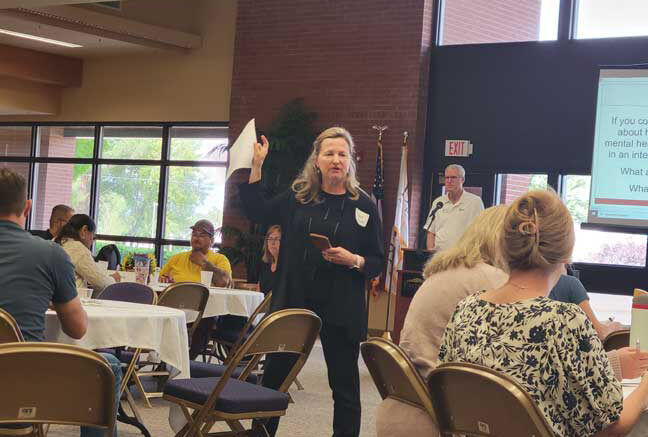THATCHER — Arizona Town Hall was at Eastern Arizona College on Friday, to discuss what can be done in the Gila Valley when it comes to mental health, homelessness and substance use.
“What are we hoping comes out of it? First is just individual actions that people take,” said Tara Jackson, Arizona Town Hall president. “You saw it happen even here today. People learned about connections and resources, and even ideas that they didn’t know about.”
Another goal, she said, is that elected leaders use the information gathered to take action that creates systemic changes.
Leaders working in the fields that address the topic were asked four questions:
● How do the conditions of mental health, substance use and homelessness relate to each other?
● How can we expand or create opportunities to address the conditions of mental health, substance use and homelessness in an integrated way?
● What are the most important actions that should be taken to address the issues of mental health, substance use and homelessness in an integrated way?
● If you could tell Arizona’s leaders just one thing about how to best address the conditions of mental health, substance use and homelessness in an integrated way, what would you tell them?
The group brainstormed ideas that will be compiled by Arizona Town hall into a position paper that will be posted at www.aztownhall.org, which can be used by organizations and elected officials at the local level.
Data shared during Friday’s town hall included that 20.1 percent of Arizona’s dealt with a mental illness in 2019, with 5.6 percent dealing with serious mental illness; 7.1 percent of Arizonans are dealing with substance use disorder, with Graham County Courts reporting that 97 percent of the criminal cases it sees involve substance use; and that 50 percent of the state’s homeless are age 50 or older, and 20 percent of the homeless are African-American, despite African-Americans making up just 4.53 percent of the state’s population.
Town halls on the issue have been conducted across the state and the data from each will be used at the state town hall, Nov. 14-16, to find commonalities that can be addressed at the state level.









